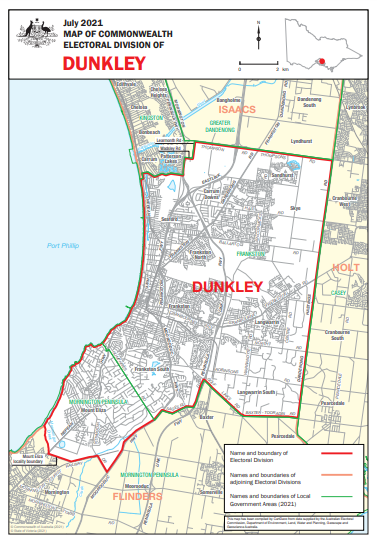|
|
|
|
| Adam Carr's Election Archive
|
Australian federal election, 2022
Division of Dunkley, Victoria
Named for: Louisa Dunkley (1866-1927), trade unionist and campaigner
for equal pay for women
Southern Melbourne: Carrum Downs, Frankston, Langwarrin, Mt Eliza, Seaford
State seats: All of
Frankston, parts of
Carrum,
Hastings and
Mornington
Local government areas: All of
Frankston, parts of
Mornington Peninsula
Borders with:
Flinders,
Holt and
Isaacs
Enrolment at 2019 election: 110,685
Enrolment at 2022 election: 111,693 (+00.9)
1999 republic referendum: No 54.7
2018 same-sex marriage survey: Yes 72.0
Sitting member: Peta Murphy (Labor):
Elected 2019
2007 Liberal majority over Labor: 4.0%
2010 Liberal majority over Labor: 1.0%
2013 Liberal majority over Labor: 5.6%
2016 Liberal majority over Labor: 1.4%
2019 Labor majority over Liberal: 2.7%
2019 notional Labor majority over Liberal: 2.7%
Liberal two-party vote 1983-2019
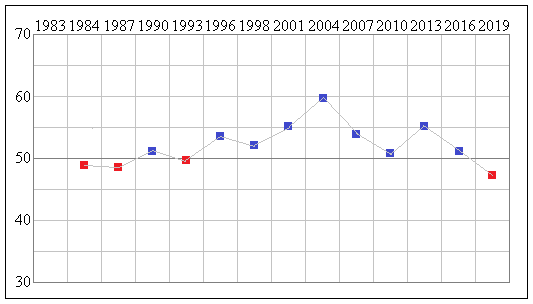
Status: Very marginal Labor
Best Labor booths, two-party vote: Aldercourt (69.5), Frankston Rail (67.0),
Ballam Park (65.2), Karingal (64.9), Carrum Downs (64.1)
Best Liberal booths, two-party vote: Mount Eliza Central (74.9), Mornington PPVC (62.6),
Mt Eliza (61.1), Baxter (56.7), Mt Eliza South (55.8)
2019 results
Statistics and history
Candidates in ballot-paper order:
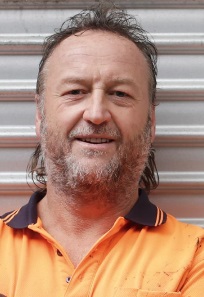 |
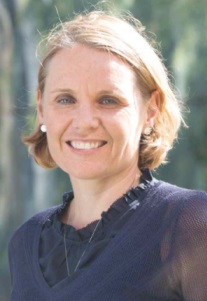 |
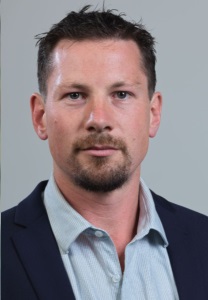 |
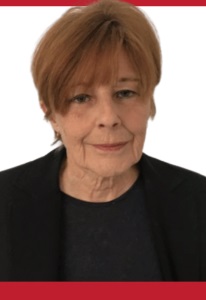 |
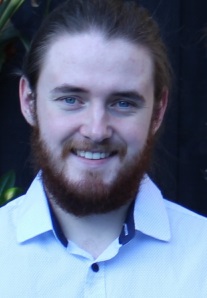 |
1. Darren Bergwerf
Independent |
2. Peta Murphy
Australian Labor Party |
3. Damian Willis
Liberal Democrats |
4. Elizabeth Johnston
Animal Justice Party |
5. Liam O'Brien
Australian Greens |
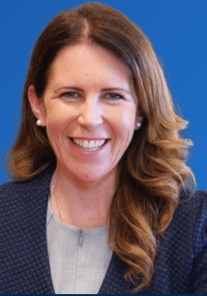 |
 |
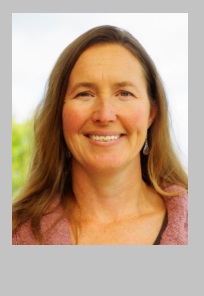 |
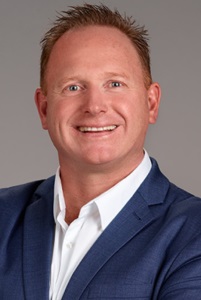 |
6. Sharn Coombes
Liberal Party |
7. Scott Middlebrook
Pauline Hanson's One Nation |
8. Kathryn Woods
Australian Federation Party |
9. Adrian Irvine
United Australia Party |
Candidate websites:
Darren Bergwerf
Sharn Coombes
Adrian Irvine
Elizabeth Johnston
Peta Murphy
Liam O'Brien
Damian Willis
Kathryn Woods
Division of Dunkley
Dunkley was created in 1984, based on Frankston, a suburban centre at the southern end of Melbourne's urban sprawl, which had been in
Flinders since Federation. Although it
has a lower
proportion of families with dependent children than most outer suburban seats, it is still sensitive to interest rates
and similar economic issues. It has among the highest proportion of people working in maufacturing and construction of any seat, and
correspondingly lower levels of university graduates and people in professional and managerial occupations. It also has a low level of
non English-speaking households for an urban seat.
A very marginal seat when it was created, Dunkley became better for the Liberals at recent elections. Frankston itself tends to
vote Labor, but subsequent redistributions extended the seat further south into solidly Liberal territory around Mt Eliza and Mornington.
The 2018 redistribution made substantial changes to Dunkley, removing the Liberal stronghold of Morningtom and adding Labor-inclined territory
in Carrum Downs and Skye to the north of the seat, formerly in
Isaacs. The only solidly Liberal territory left in the seat is Mt Eliza, one of Melbourne's
wealthiest areas. These changes turned Dunkley into a notionally Labor seat, and Labor duly won it in 2019. It has not been altered by the 2021
redistribution.
Bruce Billson won Dunkley in 1996 and held it for 20 years, despite close calls in 1998 and 2010. He was a junior minister in both the Howard
and Abbott governments, before being dropped by
Malcolm Turnbull. He retired at the 2016 election, and was succeeded by
Chris Crewther, who
survived a 4.1% swing to Labor. But the 2018 redistribution wiped out Crewther's majority, and he was defeated in 2019.
Peta Murphy, Labor MP for Dunkley since 2019, was a criminal defence lawyer and legal aid public advocate before entering politics.
The Liberal candidate is Sharn Coombes, a lawyer and former "reality TV" star, who defeated Crewther for the Liberal nomination. The
Greens candidate is Liam O'Brien, whose occupation is not stated.
Demographics:
Median weekly household income: $1,325 (Australia $1,438)
People over 65: 19.0% (Australia 15.8%)
Australian born: 72.2% (Australia 66.7%)
Non-English-speaking households: 11.4% (Australia 22.2%)
Catholics 20.4% (Australia 22.6%)
No religion 39.3% (Australia 29.6%)
University graduates: 17.2% (Australia 22.0%)
Professional and managerial employment: 31.6% (Australia 35.2%)
Employed in manufacturing and construction: 32.6% (Australia 22.9%)
Paying a mortgage: 37.7% (Australia 34.5%)
Renting: 26.4% (Australia 30.9%)
Traditional families: 30.3% (Australia 32.8%)
Back to main page
| |

